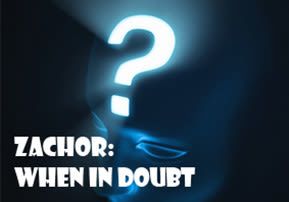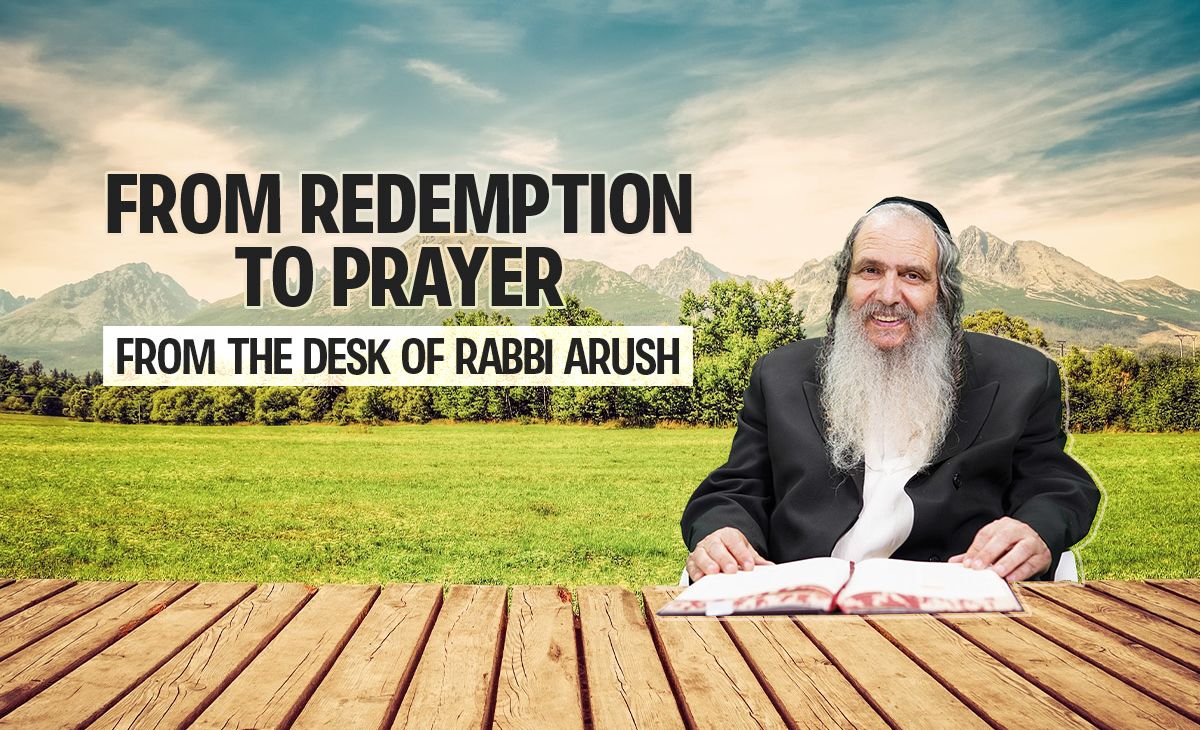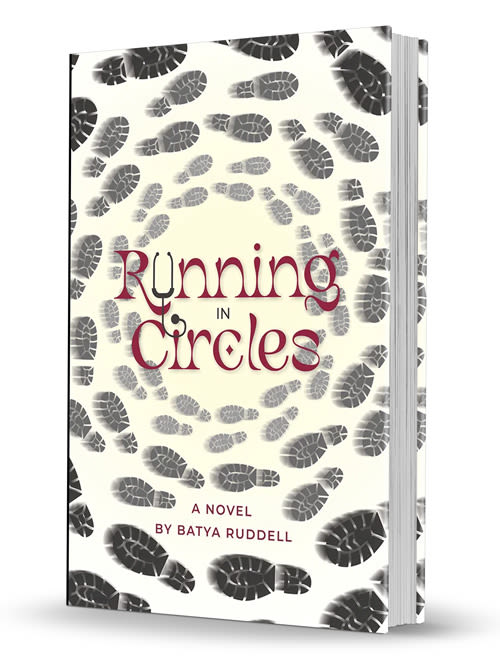This week is Parshat Zachor, which means in place of the usual maftir, we will skip ahead to Parshat Ki Teitzei and read about how Amalek attacked the Jewish people shortly after they left Egypt. Many hold that the hearing of this maftir is a Torah mitzvah that is incumbent on women too (Rav Noson Adler, zt”l, was very stringent in making sure that all the women in his house made it to synagogue to hear Parshat Zachor), which is why women make it a point to be in synagogue for this week’s Erev Purim special maftir.
The truth is that remembering what Amalek did to the Jewish people is not a once-a-year mitzvah. There is an obligation to remember every day what happened! It’s just that the Talmud says that the average memory lasts about 12 months, so we need an official reminder once every 12 months. What about during a leap year, which is 13 months long, you might be asking? For this reason, the Vilna Gaon had in mind that in such a year to fulfill this mitzvah when actually reading the maftir in its proper time – during the reading of Parashat Ki Teitzei. In this way, 12 months would not pass without reading about Amalek.
However, why is Amalek, for all the evil he did, singled out as we see in these two verses:
טו וַיִּ֥בֶן משֶׁ֖ה מִזְבֵּ֑חַ וַיִּקְרָ֥א שְׁמ֖וֹ יְהֹוָ֥ה | נִסִּֽי:
טז וַיֹּ֗אמֶר כִּי־יָד֙ עַל־כֵּ֣ס יָ֔הּ מִלְחָמָ֥ה לַֽיהֹוָ֖ה בַּֽעֲמָלֵ֑ק מִדֹּ֖ר דֹּֽר:
Moshe built an altar, and he named it, God-is-My-Banner. He said, “The hand is on God’s Throne. God will be at war with Amalek for all generations.” (Shemot 17:15-16)
After all, the Jewish people have had, and still have, many enemies. However, none have earned the wrath of G-d like Amalek did when he attacked the Jewish people shortly after the mann miraculously fell from the sky. Even though the midrash states that it is “natural” for Eisav to hate Ya’akov, still, G-d is not at war with Eisav. Even though Yishmael has been a thorn in our side throughout history his entire history, still, G-d did not take any vow to annihilate his people. Only Amalek is considered to be the complete antithesis of the Jewish nation, our spiritual nemesis.
Why?
 The clue is right in Amalek’s name. Numerically, the word Amalek (ע-מ-ל-ק—-ayin, mem, lamed, kuf) is equal to 240. It is brought down that this is not by coincidence, because 240 happens to also be the gematria of the word “ספק sufek,” which means “doubt” in Hebrew. This correlation exists to teach us that Amalek is anything that causes doubt in the mind of the Jew. But doubt in what?
The clue is right in Amalek’s name. Numerically, the word Amalek (ע-מ-ל-ק—-ayin, mem, lamed, kuf) is equal to 240. It is brought down that this is not by coincidence, because 240 happens to also be the gematria of the word “ספק sufek,” which means “doubt” in Hebrew. This correlation exists to teach us that Amalek is anything that causes doubt in the mind of the Jew. But doubt in what?
The answer to this question comes from pointing out that the name Amalek also equals the words, “el acher” (קל אחר aleph, lamed, aleph, ches, raish), which means “other god.” In other words, Amalek creates doubt in G-d’s oneness, which is the source of idol worship, that is, the belief in other powers (be they in the form of wood and stone, or gold and silver, that is, money). This is why the Torah indicates and Rashi explains that Amalek even causes a “split,” so-to-speak” in the Ineffable Name of G-d, which is another way of saying that nature gives the impression that it works independently of G-d.
How does Amalek do this?
He does this by getting away with murder, literally. For example, one of the biggest stumbling blocks in modern-day Jewry’s belief in G-d is the Holocaust. “Where was G-d in 1942?” is not an uncommon question. The underpinning of this question is, “If G-d is here and runs the world, then how could the Holocaust have occurred?”
But it did occur, and therefore, tragically, many a Jewish mind concludes, G-d must not be there.
That has been called Hitler’s greatest (or worse, depending upon who’s talking) legacy. For, every Jew who died in the Holocaust (even those who had not been strong in their belief in G-d and Torah), is considered to have died as a Jew, and had therefore sanctified the Name of G-d. Even those who “survived” the Holocaust and turned their backs on Judaism as a result have been called “Holy Disbelievers,” because of what they went through.
However, millions of Jews since then who have grown up during peaceful times have simply turned their backs on Judaism, assimilated and even intermarried, for no reason other than the fact that creation seems to be a “captain-less ship.” After all, are they not growing up in a society that believes (at least on some level) that “nice people finish last”? How could nice people lose out if G-d, Who, by definition must be just, is here and is involved in everyday life? Or, more accurately (and this is the way the question has been posed to me many times): Why doesn’t lightning come down from the sky every time there is a miscarriage of justice?
That’s Amalek’s favorite question. He uses it at every opportunity to sow seeds of doubt in the mind of the Jew. Any question about the way the world runs ends off with those words, or similar ones. And when no answer comes to mind, he simply shrugs his shoulders and says, “You see! You don’t have to be so committed to Torah and Judaism after all … Just ease up a bit … Don’t take yourself so seriously … Normalize …” What he really means to say is, “You don’t have to try to be so close to G-d since you won’t find Him anyway.”
It’s right about that point that the Hamans, the Hitlers, and the Husseins of society emerge. Like bacteria that infests an unsterile environment, Amalek grows within the spiritual void left by our own intellectual doubt. When you’re looking for “a way out,” doubt can go a long way to clear one’s conscience to “free” the person from being morally responsible, as the Talmud reveals:
The Jewish nation only worshiped idols to permit forbidden relationships in public. (Sanhedrin 63b)
On the other hand, the intellectually honest and inquisitive mind uses doubt to energize, to create the need for research to clarify and dispel doubt, to turn “grays” back into clearly defined “blacks” and “whites” … to return “good” and “evil” (which can often be subjective) back into “true” and “false” (which are absolute).
Instinctively, we may be satisfied being spiritually ignorant. However, deep inside our “heart of hearts,” we know that it is from darkness that light must emerge, that from chaos order must surface, otherwise…
To win the battle against Amalek and avoid the spiritual and physical destruction that follows in his wake, we have to re-commit ourselves to intellectual honesty, to examine and re-examine what we believe in and why we do, and what we doubt, and where the doubt stems from. Such people are the true heroes of society, for it is their questions that lead to the true answers, and which pull back the spiritual mask from over the hidden hand of G-d.
That is something worth remembering.
May we merit to draw down the “Hidden Light” of creation and witness the eradication of all false beliefs, and enjoy the sublime pleasure that comes from living doubt-free.
***
Pinchas Winston is the author of over 95 books on various topics that deal with current issues from a traditional Jewish perspective. He has also written on the weekly Torah reading since 1993, called “Perceptions,” as well as on current topics and trends affecting Jewish history, past and present. One of his missions is to make the depth and beauty of the more mystical teachings of Torah understandable and accessible to those who can really benefit from them. Visit his website at thirtysix.org.


 The clue is right in Amalek’s name. Numerically, the word Amalek (ע-מ-ל-ק—-ayin, mem, lamed, kuf) is equal to 240. It is brought down that this is not by coincidence, because 240 happens to also be the gematria of the word “ספק sufek,” which means “doubt” in Hebrew. This correlation exists to teach us that Amalek is anything that causes doubt in the mind of the Jew. But doubt in what?
The clue is right in Amalek’s name. Numerically, the word Amalek (ע-מ-ל-ק—-ayin, mem, lamed, kuf) is equal to 240. It is brought down that this is not by coincidence, because 240 happens to also be the gematria of the word “ספק sufek,” which means “doubt” in Hebrew. This correlation exists to teach us that Amalek is anything that causes doubt in the mind of the Jew. But doubt in what?











Tell us what you think!
Thank you for your comment!
It will be published after approval by the Editor.